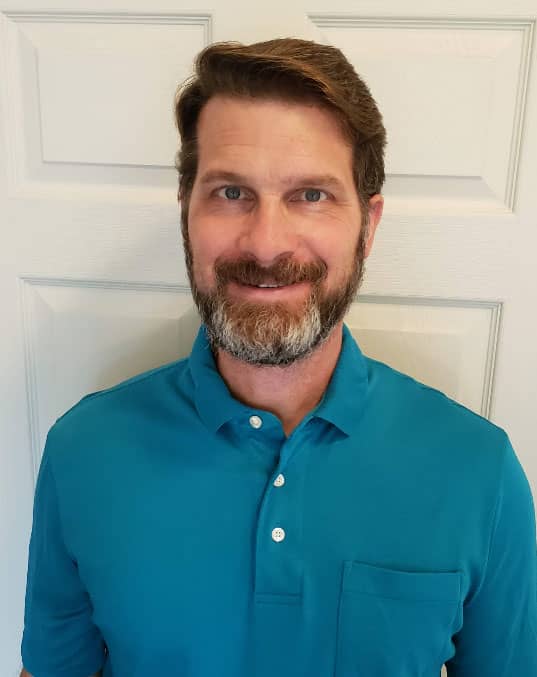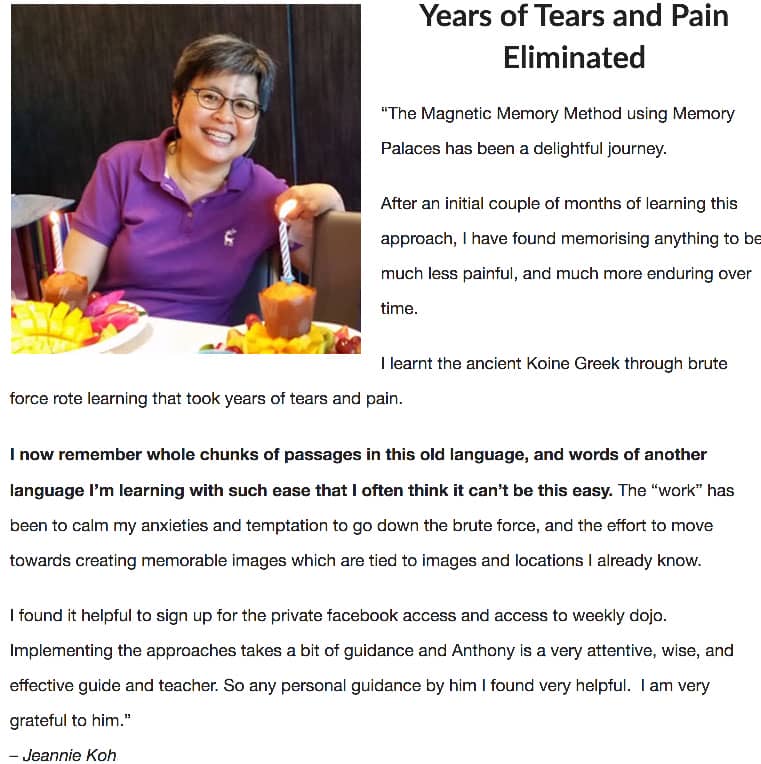Podcast: Download
Subscribe: Apple Podcasts | RSS
 Do you struggle with the Memory Palace technique to complete large learning goals?
Do you struggle with the Memory Palace technique to complete large learning goals?
For example, have you always wanted to memorize a substantial body of scripture, but…
Kept putting it off?
I know, I know…
We all have something in our life that continuously gets pushed to the bottom of our never-ending to-do list…
We all say “I’ll eventually get around to it”…
We’re all guilty of never making moves to cross that item off our list.
And yet…
My guest for this podcast, Mike McKinley, has managed to AVOID that mistake when it came to making steps toward completing one MASSIVE goal.
Mike is an alumni of the Magnetic Memory Method Masterclass. He is also an electrical engineer and specialist in the area of radio frequencies.
On top of those duties, Mike is a husband, father, seminary graduate, and full-time employee. Using the memory techniques he’s learned from the MMM Masterclass, he completed a three-year seminary course and memorized 66 chapters of the Psalms (and counting)!
So if you’re intimidated by the idea of undertaking an entire course to improve your memory…
If you feel as though you don’t have the time to commit in an already packed schedule…
Or you think, “How could I ever memorize something so lengthy?”…
Just click play on the button above now and learn from Mike all about:
- Why information is easier to remember in story form
- The reason early Christians memorized the scriptures
- Why recitation is an important memory improvement exercise
- How actors and memory students are one and the same
- The way manufacturing “spoiled us” with uniformity
- The importance of small memorization goals and practicing the loci method when taking on large learning projects
- The role of visualization exercises in memorization
- The role of compounding or compressing in memorization
- A tip on how to “reuse” celebrities, like actors, multiple times as symbols in memory work
- The way long-form memorization is like running a marathon
- The reason dogma has no place in the world of memory training and why memory is a creative event
Of course, you might be thinking…
What if I Want To Memorize Scripture In Another Language?
No problem!
Check out this incredible success story from one of Mike’s fellow Magnetic Memory Method students:
(For more success stories, please visit the Magnetic Memory Method review page.)
Like Jeannie, I also use a Memory Palace for memorizing scripture in other languages.
Here’s a demonstration and discussion of how I make it work with a Sanskrit text called Ribhu Gita:
What’s the secret to this memory method?
Easy:
Take it one S.I.P. at a time:
Study memory techniques
Implement what you learn progressively so you improve your…
Practice (daily is best)
It really doesn’t get any easier than that, and the outcomes of having scripture in your mind and heart are profound.
Dive in!
Further Resources on the Web, this podcast, and the MMM Blog:
How to Memorize Scripture And Verse Numbers In 5 Minutes Or Less (MMM Blog)
3 POWERFUL Elaborative Encoding Memory Exercises (MMM Blog)
4 Powerful Ways to Use the Pegword Method [10 Examples Included] (MMM Blog)
How Do You Choose What Bible Passages to Memorize?
Related Posts
- A Polyglot Club For Memory Palace Builders
Use this resource to find great foreign language vocabulary words for memorizing in your Magnet…
- Tap The Mind Of A 10-Year Old Memory Palace Master
Alicia Crosby talks to us about how she memorized all of Shakespeare's plays in historical…
- Memorize All 66 Bible Books with the Memory Palace Method
Forget songs and rote repetition. This step-by-step guide shows you how to memorize all 66…







2 Responses
I was fascinated by this podcast, because I just cannot get to grips with the memory palace technique despite numerous attempts. I’ve always used association of ideas and to some extent images to remember things (I’ve learned a number of languages over the years) and so the MMM course made a lot of sense for me in enhancing that technique. But I get absolutely bogged down with attaching those things to loci because I just find the effort of remembering which thing was attached to that locus insurmountable. It seems totally irrelevant. I loved Mike’s ideas about telling stories around things and just going for the images. It’s essentially what I do although I haven’t put it to the test in the big way that Mike has. Great podcast.
Thanks for this, Rosemary.
I think the thing to pick up is that stories are spatial – and every one is always already organizing their associations in space, with the assistance of space or with reference to it.
I would love to know more about what you’ve been trying in greater detail. Your use of the term “attaching” suggests that something needs changing in your approach because that is indeed not only irrelevant – it’s not possible. You can only “attach” one thing to another if it is physical.
In all cases, please don’t interpret this interview as a stopping point for the technique. I’m pretty amazed by the raw volume Mike has managed without a Memory Palace, but also speculate that there’s still an implicit “Memory Palace” involved due to the nature of how these techniques work and how information is stored in the brain.
But if you still can’t commit high volumes of information after thinking through this discussion and trying a few things, please say more about what specifically you’ve been doing in your attempts. There will be clues and the way you think about it matters. It’s not typically about attachment, and so there’s a big one that could create a dramatic shift for you.
I’d like to see that happen! 🙂